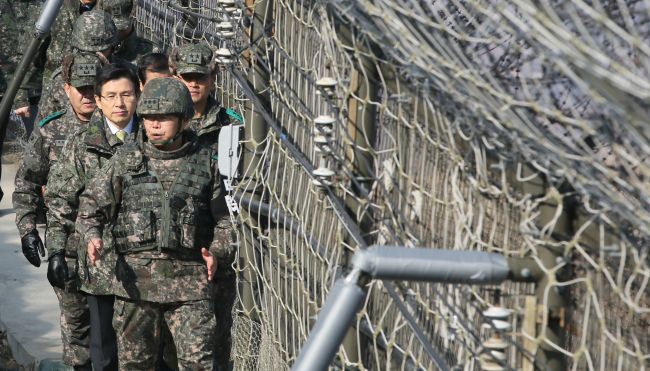North Korea’s preparations for a satellite launch appear to be an effort to show progress in building a militarily strong nation ahead of its ruling party’s national congress in May, analysts said Wednesday.
Through the rocket launch, the reclusive regime may also want to show people at home and abroad that it will go its own way despite mounting calls for it to renounce its nuclear program, which it has defended as critical for its self-defense, they noted.

Prime Minister Hwang Kyo-ahn surveys the border area in Cheolwon, Gangwon Province, Wednesday. Yonhap
Pyongyang notified the International Maritime Organization Tuesday that it would launch an “earth observation satellite” between Feb. 8 and Feb. 25. The notification came amid moves by South Korea, the U.S., Japan and others to adopt stringent sanctions for the North’s Jan. 6 nuclear test.
“North Korea seems to be striving to reaffirm its status as a nuclear-armed state by conducting tests on a submarine-launched ballistic missile, nuclear device and then on an intercontinental ballistic missile,” said Ahn Chan-il, head of the World North Korea Research Center.
“All these tests should come ahead of the ruling Workers’ Party’s national congress, where the North will trumpet its military achievements. After firming up its military status, Pyongyang would move to focus on economic reform as the next step forward.”
Since there are few economic achievements for him to boast of at the seventh party congress, which will be the first in 36 years, North Korean leader Kim Jong-un is expected to highlight his country’s progress in the military domain.
The party congress is one of the country’s most crucial events, in which the North Korean ruler is slated to wrap up his party’s feats and unveil a national vision for the future.
Pyongyang’s satellite launch announcement came before the U.N. Security Council adopts a fresh resolution of new sanctions for its latest nuclear test, and during a surprise visit to Pyongyang by Beijing’s top nuclear envoy Wu Dawei.
This appears to be a signal that North Korea will not succumb to any tougher sanctions, and would not care about international criticism of its provocative behavior, though it would take note of Beijing’s efforts for dialogue with it.
“By planning a rocket launch, Pyongyang is insinuating that it does not care about sanctions, and that it would exercise what it calls its own sovereign right to develop its military capabilities,” said Chang Yong-seok, a senior researcher at the Institute for Peace and Unification Studies at Seoul National University.
“Pyongyang also seems to be giving a tacit message to Beijing that it would reject China’s interference in its domestic affairs and sovereign activities -- given that Pyongyang announced the satellite launch plan even as Wu Dawei was visiting the North.”
Pyongyang’s plan for a rocket test had widely been expected, as it is necessary for it to develop both nuclear warheads and delivery vehicles, so as to attain its long-cherished goal of becoming a nuclear power.
The North’s rocket test is expected to enhance its missile technology. Experts say the North’s launch in 2012 showed that it could get a missile to travel some 10,000 kilometers -- far enough to reach the U.S. mainland. Since its 1998 test of the Taepodong-1 missile, the North has carried out five long-range rocket tests
Pyongyang’s planned satellite launch is sparking concerns that it could escalate tensions between the three partners of South Korea, the U.S. and Japan, and another three-member bloc of China, Russia and North Korea.
Seoul, Washington and Tokyo have been pushing for harsh sanctions for Pyongyang’s nuclear test. This has triggered tensions with Beijing and Moscow, which argue that a sanctions-centric approach would not be effective and would only hurt peninsular security.
“China’s stance would be a critical variable here -- whether it would maintain a lukewarm stance over Pyongyang or shift its approach toward Pyongyang after a rocket launch,” said Park Hyeong-jung, a senior research fellow at the Korea Institute for National Unification.
By Song Sang-ho (
sshluck@heraldcorp.com)






